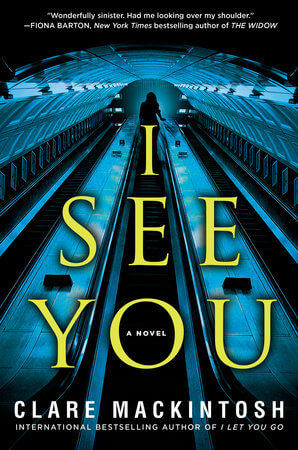Top 10 Writing Tips: Clare Mackintosh
- Find your premise.
The best novels can be distilled into a single sentence, and finding the heart of your story is the best way to stay on track while you’re writing. Try explaining the book to someone else; the extra objectivity can make this exercise easier. Once you can summarize the story in a sentence or a question, write it on a Post-it note and stick it to your computer. Whenever you’re stymied, come back to the central premise of the novel.
- Build your characters.
Even a fast-paced, plot-driven thriller needs well-rounded, authentic characters, so take time to build your cast. Spend time with them—what do they look like? What do they have for breakfast? A useful exercise is to take one of the “day in the life” interviews you find in celebrity magazines and websites, and run through it with each of your characters. The answers may never find their way into your book, but they will help you understand what motivates your characters.
- Put it in the diary.
Commit to writing in the same way you would commit to a weekly aerobics class or a date with a friend. If it’s not in the diary, there’s a risk it won’t happen, so afford it the importance it deserves. Diarizing your writing time also encourages others in the family to respect what you’re doing.
- Create a writing space.
We all know Virginia Woolf’s famous quote about needing a “room of one’s own,” but not everyone has the luxury of a personal writing room. If you don’t have a study, it’s important to create a writing zone that helps get you in the right frame of mind. This might be a corner of the kitchen with a pair of headphones and the perfect playlist, or it could be your favorite table in the local café with a cappuccino at your side.
- Plan what you’re going to write.
Writers are often divided into two camps: plotters and pantsers—writing by the seat of your pants. Even if you’re a pantser, if writing time is limited, it helps to have a rough idea of what you hope to achieve in each writing session. I do this on my way back from the school run or on the morning dog walk so that when I sit down at my desk, I’m ready to start.
- Never begin with a blank page.
Blank pages are terrifying, so try and avoid them as much as you can! Once you’re up and running, try and finish each writing session halfway through a scene, so that the next time you sit at your computer you can jump straight into it. If you happen to finish at the end of a chapter, take time to jot down a few thoughts about the next one—your future self will thank you for it!
- Don’t look back.
It’s tempting to go back over the previous day’s work, to hone and polish it, but that can sometimes mean progress is slow. When you’re writing a first draft, my advice is to push forward and resist the temptation to edit as you go. Characters and plot are likely to develop over the course of the draft, and you might well find out that the chapter you spent two days finessing doesn’t even make the final cut.
- Reward yourself.
Writing is hard work, so you deserve a reward. You’re your own boss, so be a nice one, and incentivize yourself! It might be a weekend break once the first draft is down, or a glass of wine once you’ve finished that tricky chapter. If you’re easily distracted by social media, promise yourself a stint on Twitter once you’ve hit 500 words.
- Put it to one side.
When you finish your work—whether it’s a poem, a short story, or a novel—put it to one side and do your best to forget about it for a few weeks. It’s the hardest thing in the world, but something magical happens when you do it. You’ll return to it with fresh eyes and an objectivity that will enable you to…
- Edit, edit, edit…

Clare Mackintosh
Few of us produce perfect work in one draft, and if you thought the hard work was over when you typed The End, think again. Look at your manuscript from the point of view of the reader: is it a page-turner? Is the pace even? Do your characters come off the page? Is the setting evocative? It can easily take as long to edit a book as it does to produce the first draft, so this isn’t a stage to be rushed. It’ll be worth it, though. I promise.
Bio: Clare Mackintosh spent twelve years in the Thames Valley Police Department, during which time she worked on criminal investigations. She left the police force in 2011 to work as a freelance journalist and social media consultant. She is the Director of the Chipping Norton Literary Festival and lives in the Cotswolds with her husband, a police officer, and their three children. Visit Clare Mackintosh online at claremackintosh.com, Facebook.com/ClareMackWrites and on Twitter @claremackint0sh


Very useful tips. Except for tip number 7 which, at my age, I would have to reject because by the following morning I will have forgotten what I’d written the previous day. 😉